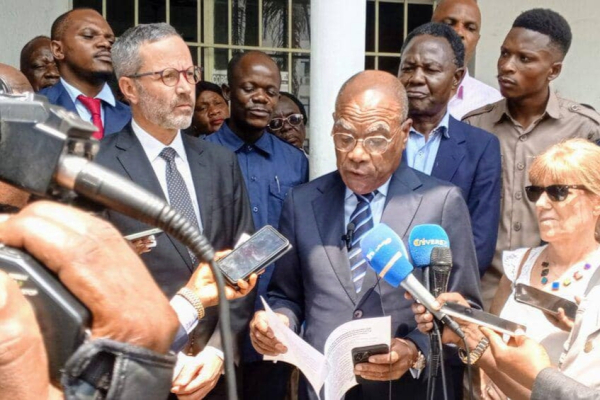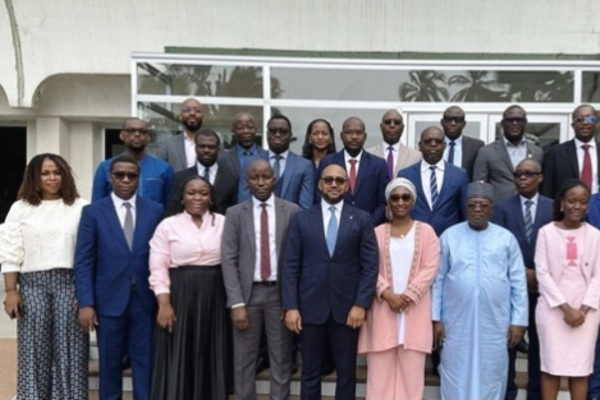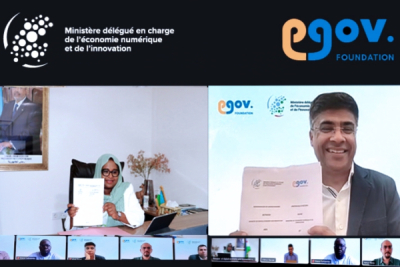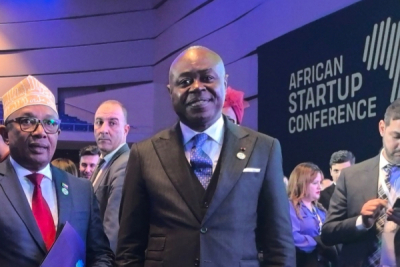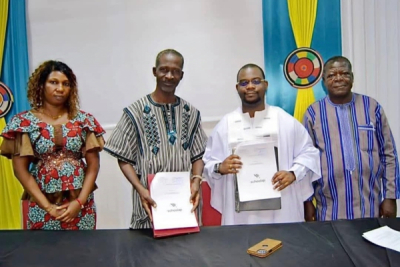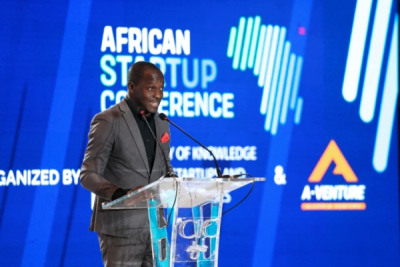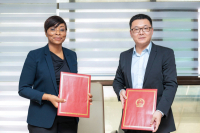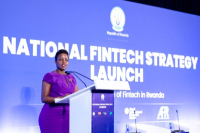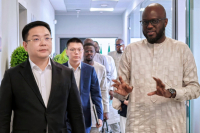
Tech (802)
Digitizing cultural institutions has emerged as a critical priority for many nations seeking to preserve their heritage and enhance public access to knowledge. International collaboration is essential to support these modernization efforts.
The Democratic Republic of Congo (DRC) has requested France’s assistance to modernize and digitize its National Library. The project was presented by MP Léonard She Okitundu during a visit by French Ambassador to the DRC, Remy Maréchaux, to this library on Monday, December 9.
"Equipping the Democratic Republic of Congo, the largest Francophone country, with a modern National Library is crucial for promoting and preserving the French language within the framework of global linguistic diversity," said Léonard She Okitundu. He also emphasized the urgency of digitizing the institution to meet current demands, noting that French President Emmanuel Macron has previously shown openness to supporting this initiative.
This appeal aligns with the DRC’s ongoing digital transformation efforts under its National Digital Plan "Horizon 2025." The National Library, established in 1989 and a cornerstone of the country’s heritage, faces significant challenges due to its deteriorating state. Housing over 120,000 books and 700,000 historical black-and-white photographs, the library urgently requires digitization to prevent irreversible damage or loss from potential disasters like fire, which could jeopardize decades of conservation and cultural enrichment efforts.
Should discussions about funding, raised by Remy Maréchaux, come to fruition, digitizing the National Library would bring several notable benefits. It would safeguard historical documents against the ravages of time and improve accessibility by making them available on digital platforms, thereby reaching a wider and more diverse audience. Furthermore, this digitization would enhance the dissemination of Congolese knowledge and culture on a global scale.
By Samira Njoya
Editing by Sèna D. B. de Sodji
While many African countries express growing interest in e-government initiatives, securing domestic funding for these projects presents significant challenges. Diversifying funding sources at the continental level could offer a viable solution.
The West African Development Bank (BOAD) and the German development bank KfW recently launched the Digital Transformation Fund (DTF), designed to serve the West African Economic and Monetary Union (WAEMU) region.
The launch, in Lome, follows years of development, with the project initiated in 2020. Envisioned as both a financial and strategic tool, the DTF aims to support digitalization projects across the eight WAEMU member states.
The fund is dedicated to transforming public administrations through the modernization of technological infrastructure, the development of information systems, and the implementation of innovative digital solutions. Its flexible and scalable resources will be tailored to the specific priorities of each participating country.
"The DTF embodies our collective ambition to build modern administrations capable of effectively meeting the needs of our populations in an ever-changing world," said BOAD Vice President, Moustapha Ben Barka, when presenting the initiative at the launch event.
In Togo, the fund arrives as the country strives to enhance its digitalization efforts and modernize public services. In recent years, the Ministry of Digital Transformation, supported by the operational efforts of the Togo Digital Agency, has implemented significant reforms, including the digitization of numerous administrative services. The country aims to digitalize 75% of public services by 2025.
Ayi Renaud Dossavi
Djibouti is proactively pursuing digitalization to modernize its public sector and drive sustainable growth. By cultivating strong partnerships with international leaders in technology, the nation aspires to become a beacon of digital transformation within East Africa.
Djibouti’s Ministry of Digital Economy and Innovation (MDENI) announced on Tuesday, December 10, the signing of a memorandum of understanding with eGov Foundation, an Indian organization specializing in open-source solutions for public services. The partnership aims to accelerate Djibouti’s digital transformation by leveraging the DIGIT platform, developed by eGov, to enhance public service delivery, foster innovation, and advance the country’s national digital agenda.
"This partnership is a crucial step toward realizing our vision of a digitally autonomous Djibouti. Implementing solutions such as the building permit system will not only transform public services but also position Djibouti as a leader in using technology to drive sustainable urban growth," said Mariam Hamadou Ali (photo, left), Minister of Digital Economy and Innovation.
Founded in India, eGov Foundation is a globally recognized leader in open-source digital solutions designed to improve governance and citizen experience. This collaboration aligns with its mission to provide digital public goods and support developing countries in their digital transformation efforts by 2030. For Djibouti, the initiative is part of the "Djibouti Smart Nation" roadmap, which lays out the national digital sovereignty strategy.
Under the partnership, several projects will be launched, including a pilot phase for a building permit system aimed at streamlining administrative processes and enhancing transparency. The DIGIT platform will also be deployed across other key sectors such as healthcare, sanitation, public finance, and local governance. Additionally, a capacity-building program will be implemented, including knowledge transfer to local teams to ensure the autonomous management of digital tools.
This collaboration marks a significant milestone in Djibouti’s efforts to modernize its public services. While the country currently ranks 174th globally in the 2024 E-Government Development Index (EGDI), with a score of 0.2911 out of 1—below the regional average of 0.3903 and the global average of 0.6382—this initiative underscores the government’s determination to tackle these challenges head-on.
By Samira Njoya,
Editing by Sèna D. B. de Sodji
AI is revolutionizing economic and social models worldwide, providing innovative solutions to complex challenges. In Africa, it raises significant hopes for accelerating sustainable development, reducing inequalities, and fostering local innovation.
The Congolese government views artificial intelligence (AI) as a strategic lever for accelerating digital and economic development, according to Minister of Posts, Telecommunications, and Digital Economy Léon-Juste Ibombo. Speaking at the 3rd African StartUp Conference held in Algiers last week, Ibombo outlined the country's AI vision, emphasizing innovation and international collaboration.
One of the key priorities identified is the improvement of AI research. To meet this challenge, Congo, in partnership with the Economic Commission for Africa (ECA), has launched the African Center for Research in Artificial Intelligence (CARIA). Located in Brazzaville, the center aims to act as a catalyst for innovation and south-south cooperation in fields such as computer vision, robotics, and genetic computing.
Léon-Juste Ibombo also highlighted Congo’s initiatives to direct AI toward economic and social development. For nearly seven years, the country has recognized digital innovation through the Sassou-Nguesso Prize, an initiative complemented by the Seeds for the Future program in collaboration with Huawei to promote local start-ups. In 2022, a specific law on start-up certification was enacted to encourage their growth and attract investments in this strategic sector.
Congo also seeks to play a key role in training and developing local skills by collaborating with Cameroon to establish an Inter-State University on Digital Technology. This strategic project aims to forge strong links between universities and industries to promote innovation and support young talent in fields such as AI and robotics.
Beyond research and training, the country aims to explore AI’s transformative potential in critical sectors such as healthcare, agriculture, transportation, and finance.
All these projects align with a continental momentum, where AI is seen as a technology capable of addressing major social and economic challenges. For Africa, leveraging this technology offers an opportunity to bridge the digital divide, modernize economies, and strengthen local capacities. According to Olumide Balogun, Google’s Director for West Africa, AI could contribute up to $1.5 trillion to Africa’s GDP by 2030.
By Samira Njoya,
Editing by Sèna D. B. de Sodji
Information and communication technologies (ICT) hold significant potential to foster creativity and learning from an early age. However, in Africa, their integration into education remains limited, hindered by a lack of preparedness and inadequate infrastructure.
SCHOOLAP, a digital platform dedicated to remote education, announced on Friday, December 6, a strategic partnership with the National Union of Secular Private Educational Institutions (UNEPEL) in Burkina Faso. The project aims to modernize more than 1,400 private secular schools across the country through tailored technological solutions.
“Several pilot schools in Ouagadougou are currently being activated with data collection, training for stakeholders, and the provision of educational tablets. Initial feedback has been very positive, particularly regarding tools designed for school directors,” SCHOOLAP stated in a press release.
This initiative aligns with a broader continental push for educational advancement. The African Union has designated 2024 as the "Year of Education," urging nations to intensify efforts to ensure inclusive, quality education. As part of this momentum, the African Union’s Digital Education Strategy (2023–2028) prioritizes the development of digital infrastructure in schools. Goals include equipping at least 50% of schools with high-speed internet by 2027 and ensuring that one-third of students and all teachers have access to digital devices by 2030.
The partnership between SCHOOLAP and UNEPEL represents a significant step forward for Burkina Faso, where digital educational infrastructure remains underdeveloped. By modernizing school management and providing tailored educational tools, this initiative not only enhances teaching but also positions the country within a continental vision focused on the future of education in Africa.
By Samira Njoya,
Editing by Sèna D. B. de Sodji
Artificial intelligence (AI) presents a significant opportunity to accelerate technological and economic development in Africa. Recognizing its immense potential, countries across the continent are actively striving to coordinate their efforts, define common strategies, and maximize its impact.
African digital ministers are advocating for the implementation of unified policies on artificial intelligence (AI) across the continent, according to the "Algiers Ministerial Declaration on StartUp and AI Development" adopted at the third African StartUp Conference.
The declaration, issued after the three-day conference held in Algiers from December 5-7, emphasized the need for strengthened cooperation among African nations. Ministers from 45 countries stressed the importance of defining a common regulatory framework tailored to the unique challenges of digital development in Africa.
A unified framework would harmonize regulations, promote knowledge-sharing, and mobilize resources for large-scale AI projects, creating an ecosystem conducive to innovation and technological development across the continent. It would also facilitate strategic investments in digital infrastructure while opening new markets for African start-ups on a regional and global scale.
However, significant challenges remain, including a lack of specialized AI skills, inequalities in access to technology between urban and rural areas, and insufficient infrastructure such as data centers and high-speed networks. To address these challenges, ministers called for increased training, expanded public-private partnerships, and efforts to ensure equitable access to technology across the continent.
This initiative aligns with the African Union's Agenda 2063, which prioritizes innovation and digital transformation as drivers of socio-economic development. The United Nations Development Programme (UNDP), in its "Africa Development Insights" report, estimates that AI could contribute up to $1.2 trillion to Africa's GDP by 2030.
A unified AI policy has the potential to transform Africa's digital landscape. It could create an integrated digital ecosystem, foster inter-African cooperation, establish strategic partnerships between universities, research centers, and businesses, and position Africa as a key global player in the field of artificial intelligence.
By Samira Njoya,
Editing by Sèna D. B. de Sodji
Digital transformation has emerged as a key driver of economic and technological development across African nations. Through strategic partnerships, innovative initiatives are taking shape to enhance local skills and modernize digital infrastructure.
China has pledged to support Guinea in establishing a Digital Cooperation Academy to train local talent and bolster the country's technological ecosystem, the Guinean government said on Wednesday.
The announcement followed a meeting on Tuesday between Rose Pola Pricemou (photo, left), Guinea's Minister of Posts, Telecommunications, and the Digital Economy, and a Chinese delegation led by Mao Shanshui (photo, right), third secretary at the Chinese embassy in Guinea.
The academy will offer training programs in strategic sectors such as artificial intelligence, data analytics, and cybersecurity, aiming to drive Guinea's digital transformation. It will also support local startups to foster innovation and promote digital entrepreneurship.
This project is part of the broader Guinea-China partnership, highlighted by the completion of the tenth phase of their technical assistance program. This collaboration has already modernized telecommunications infrastructure through the deployment of cutting-edge technologies and improved connectivity services.
In addition to the academy, discussions yielded other key projects, including the construction of new data centers to expand Guinea's data storage and processing capacity.
Both parties agreed to deepen collaboration to accelerate knowledge transfer to Guinean professionals and enhance the performance of broadcasting centers, advancing local talent development and the modernization of the country's digital ecosystem.
Furthermore, an agreement was reached for the official handover of four modernized broadcasting centers in Sonfonia, Labé, Kankan, and Nzérékoré. This marks a significant milestone in upgrading Guinea's telecommunications infrastructure.
These initiatives align with Guinea's digital roadmap, which aims to position the country as a leading technological hub in West Africa. Beyond improving connectivity, they are expected to create new economic opportunities, bridge the digital divide, and enhance Guinea's competitiveness on the global stage.
By Samira Njoya,
Editing by Sèna D. B. de Sodji
The fintech sector is experiencing rapid growth across Africa, unlocking new economic and technological opportunities. Rwanda aims to capitalize on this momentum to position its economy as a key hub for financial innovation on the continent.
On Thursday, November 28, Rwanda unveiled a five-year national fintech strategy designed to foster a conducive ecosystem for financial innovation and position the country as a regional financial hub.
“This strategy is not just a policy document but also a commitment to positioning Rwanda as a leading financial technology hub in Africa. In 2014, we had only three registered fintech companies; today, we boast over 75 active fintech players serving more than three million users across the country,” said Paula Ingabire (photo), Rwanda’s Minister of ICT and Innovation.
Over the years, Rwanda has invested heavily in ICT to modernize its economy and expand access to financial services. This new strategy builds on these efforts, yielding significant results. Official data show that financial inclusion rates have risen from 93% in 2020 to 96% in 2023. These achievements reflect the country’s firm commitment to transforming itself into a model digital economy in Africa.
The strategy sets ambitious targets: hosting 300 fintech companies by 2029, creating 7,500 direct jobs, and attracting $200 million in investments. The government also aims to achieve an 80% adoption rate of fintech services, rank among the top 30 countries in the global fintech index, and become Africa’s foremost technological and financial hub.
By Samira Njoya,
Editing by Sèna D. B. de Sodji
The integration of digital technologies is gradually transforming traffic management, providing innovative solutions to streamline traffic flow and enhance safety. In Africa, these initiatives are gaining momentum, reflecting a commitment by countries to modernize their transportation infrastructure.
On Friday, November 29, Senegal’s Minister of Infrastructure, Land, and Air Transport, Malick Ndiaye (photo, right), met with Terry HE (photo, left), President of Huawei Northern Africa (North, West, and Central Africa). Their discussions focused on the implementation of a road traffic digitization project aimed at improving traffic flow and enhancing road safety across the country.
During the meeting, several adjustments were agreed upon to maximize the project’s impact. A comprehensive coverage plan for the Dakar region was finalized, including the strategic deployment of digital systems for optimal coverage. The number of traffic radars will be doubled, with a particular focus on high-risk interurban areas prone to accidents. Additionally, the project will include the training and immersion of 10 Senegalese engineers tasked with independently managing the digital platforms and infrastructure introduced through the initiative.
This visit follows Huawei’s recent presentation of its intelligent and connected transport system to Senegalese government officials, specifically designed for Dakar. The project aligns seamlessly with Senegal’s ongoing digital transformation strategy, which aims to modernize infrastructure while integrating innovative technological solutions to address urban and national mobility challenges.
Scheduled for rollout next year, the project aspires to significantly improve traffic fluidity, reduce accidents, and enhance the enforcement of traffic regulations. Moreover, the training of Senegalese engineers will bolster the nation’s technological capabilities, ensuring the project’s sustainability while fostering local expertise in strategic digital sectors.
By Samira Njoya,
Editing by Sèna D. B. de Sodji
With over 12 years of experience in finance, consulting, and digital transformation, he offers innovative approaches to training, e-learning, recruitment, and onboarding.
Youssef Jbel (photo) is a Moroccan finance expert and entrepreneur in the technology sector. He is the co-founder and CEO of NowEdge, a tech company specializing in learning and development.
Founded in 2020, NowEdge supports organizations in their transformation efforts by enhancing the skills of their teams. The company offers an innovative SaaS platform for training, built around two core principles: gamification and realistic simulations.
“At NowEdge, we offer two main HR solutions: training gamification and digital onboarding. Our approach is to make content more interactive and engaging through storytelling and scenario design. For example, in onboarding, we create fun, digital journeys that help new employees easily grasp the company’s values and mission. These solutions can be tailored to various industries, from pharmaceutical labs to banks,” explained the CEO of the startup, which boasts 2,500 users and seven ready-to-use training games.
Youssef Jbel graduated in 2011 from the National Institute of Applied Sciences (INSA) in Toulouse, France, with a master’s degree in applied mathematics, statistics, modeling, and financial mathematics. In 2012, he earned a second master’s degree in quantitative mathematics and finance from the prestigious École des Ponts et Chaussées, also in France.
That same year, he joined Mosaic Finance, a French investment firm, as a trader. Three years later, he moved to Société Générale Corporate and Investment Banking, working in the equity derivatives pricing and solutions department. In 2017, he returned to Morocco to serve as a senior structurer at Attijariwafa Bank. From 2019 to 2022, he worked as a project manager in quantitative modeling and analytics at OCP Solutions, a firm specializing in business consulting and services.
By Melchior Koba,
Editing by Sèna D. B. de Sodji
More...
Without robust security measures, digital transformation in Africa risks failure. In Congo, where significant investments are driving ICT growth, a strong focus on digital security is placed on protecting online users and safeguarding critical systems.
Léon Juste Ibombo (photo), Congo's Minister of Posts, Telecommunications, and the Digital Economy, delivered the keynote address on Monday, November 25, at the second edition of the Brazza Cybersecurity Forum. He emphasized the critical importance of digital security in light of the exponential rise in cyber threats across all sectors and affirmed that cybersecurity lies at the heart of Congo's strategic development.
"Cybersecurity is no longer optional but an imperative in an increasingly connected world," Ibombo said.
In recent months, Congo has ramped up strategic partnerships as part of its national digital transformation strategy, "Congo Digital 2025." Although cybersecurity is a priority within this initiative, the country remains behind in this domain. According to the Global Cybersecurity Index 2024 published by the International Telecommunication Union (ITU), Congo is ranked in Tier 4 with a score of 27.61 out of 100, highlighting significant gaps in digital protection and underscoring the urgency to accelerate efforts. It was thus placed in the “Evolving” category.
"Evolving represents countries that obtained an overall score of at least 20/100 by demonstrating a basic cybersecurity commitment to government-driven actions that encompass evaluating, establishing or implementing certain generally accepted cybersecurity measures in at least one pillar, or several indicators and/or sub-indicators," the ITU explained in its report.
Congo lags in four of the five pillars comprising the index. While it scored 14.12 out of 20 in legal measures, it earned a dismal 0 out of 20 in technical measures, 0.72 in capacity building, 3.9 in organizational measures, and 8.87 in cooperation with regional, continental, and global partners.
To achieve its goal of becoming a technology hub, Congolese authorities must prioritize several actions. These include establishing technical infrastructures such as Computer Emergency Response Teams (CERT/CSIRT) and cybersecurity threat protection measures, investing in education, awareness, and research to build cybersecurity skills, and forging international and regional partnerships to combat cyber threats. Active participation in agreements and collaborative initiatives will also be essential.
Adoni Conrad Quenum
Africa's cultural heritage, encompassing ancient artifacts, oral traditions, music, and manuscripts, forms the backbone of its identity. With thousands of artifacts at risk due to environmental degradation, conflict, and illegal looting, digitization safeguards against loss.
Telecommunications tower company IHS Nigeria announced, on November 21, a partnership with the National Commission for Museums and Monuments (NCMM) and the Federal Ministry of Art, Culture, and the Creative Economy (FMACCE) to digitize Nigeria’s cultural heritage. This collaboration seeks to preserve and showcase the nation’s historical artifacts and cultural monuments through a cutting-edge digital museum platform.
Speaking on the initiative, Mohamad Darwish, CEO of IHS Nigeria, emphasized the company’s dedication to cultural preservation and community development. “As a company deeply rooted in Nigeria, we recognize the importance of preserving, protecting, and promoting our cultural heritage,” he said.
The digital museum, the first major project under Nigeria’s Digital Culture Initiative, aims to provide greater public access to the country’s rich cultural heritage. Leveraging advanced technology, the initiative will ensure that Nigeria’s historical and artistic treasures are preserved and made accessible to a global audience.
The initiative aligns with President Bola Ahmed Tinubu's Renewed Hope program, which aims to promote Nigeria's rich cultural heritage, diverse tourism landscape, and creative potential to catalyze economic growth in these key sectors. The program aims to strengthen communities, create sustainable jobs, and reinforce Nigeria's position on the world stage.
According to Olugbile Holloway, Director General of the National Commission on Museums and Monuments, “We believe that to keep ahead of current trends and attract a younger demographic, it is imperative to create and make available to the public a digital experience of our rich cultural heritage. The digital museum will be an invaluable resource for researchers, students, and the general public, both in Nigeria and worldwide, and will play a crucial role in the preservation of our national heritage.”
Hikmatu Bilali
The digital revolution is profoundly reshaping African economies, with technological infrastructure at the heart of this transformation. In this context, data centers are emerging as critical drivers, ensuring access to efficient and sovereign digital services.
Cameroonian cloud service provider ST DIGITAL launched the construction of its Tier 3 data center on Friday, November 22, at the VITIB technology park in Grand-Bassam, Côte d’Ivoire. This strategic project aims to bolster the country's digital sovereignty and meet the growing demand for advanced digital services.
"Our data center, spanning 4,000 square meters, will be a high-security, state-of-the-art, eco-friendly infrastructure with a reduced carbon footprint. We’ve even planned innovative initiatives such as creating artificial lakes and vegetable gardens using outputs from the air-conditioning systems," said Steve Tchouaga, CEO of ST DIGITAL.
This initiative comes as digital transformation accelerates across Africa, accompanied by a surge in cloud adoption. According to PwC's Africa Cloud Business Survey 2023, published in February 2024, 50% of African businesses have already integrated cloud technology into their operations, and 61% plan to fully transition by 2026.
Set to be operational by the end of the first quarter of 2025, the new data center will offer cutting-edge services, including modular colocation spaces, a landing station for submarine cables, and infrastructure designed for artificial intelligence. For Côte d’Ivoire, the facility represents a strategic lever to fast-track digital transformation, foster the local economy, and position Grand-Bassam as a leading tech hub in West Africa, driving innovation and attracting new investments.
Samira Njoya
In an increasingly digital world, countries are striving to bolster their technological capabilities. Local solutions, particularly free and open-source software, play a crucial role in this dynamic.
On Tuesday, November 19, Algerian Minister of Higher Education and Scientific Research Kamel Baddari presided over the official launch of Algeria's operating system at the Dr. Moulay Tahar University in Saïda. The Linux-based system marks a milestone in the country’s digital modernization efforts and the enhancement of its technological capabilities.
“This fully Algerian system is the outcome of collaborative work between students and software researchers from multiple universities. This Linux distribution, blending user-friendliness with robust security, will enhance computer performance and safeguard our information systems. It also lays the groundwork for an open technology economy by providing a strong foundation for the development of numerous software startups,” Baddari said during the ceremony.
The initiative is part of a broader national strategy to modernize Algeria’s universities and position them as hubs for technological innovation. Spearheaded by Dr. Moulay Tahar University, the project involved a nationwide competition, with 10 university teams tasked with designing the operating system. This effort mirrors other recent technological advances in Algeria, such as the launch of the country’s first electric car in April 2023, developed by the Industrial Technology Research Center (CRTI).
The launch coincides with robust global growth in the open-source software market. According to a 2024 report by research firm GitNux, the global open-source market, valued at $21.7 billion in 2021, is projected to reach $66.84 billion by 2026. Additionally, open-source software adoption reportedly saves companies around $60 billion annually worldwide.
These figures underscore the significance of Algeria’s project, which could strengthen the country’s position in the global open-source market while fostering local innovation. The Algerian operating system, designed to meet the demands for cybersecurity and efficiency, could play a pivotal role in the country’s digital transformation while showcasing the talents of its young researchers and entrepreneurs.
Samira Njoya


